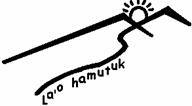
Bulletin | Surat Popular | Topic index | Reports & Announcements
Mission Statement | How to Join the LH Listserv | Home

La'o Hamutuk letter to SRSG on justice
On 17 October 2005, the Special Representative of the United Nations Secretary-General for Timor-Leste invited four local NGOs to discuss justice. Mr. Hasegawa was gathering information in response to a recent letter from the UN Security Council President asking the Secretary-General to recommend "practically feasible approaches" to justice in light of the report of the UN Commission of Experts and the views of Timor-Leste and Indonesia governments. The SRSG asked each organization to write listing our main concerns, which he would forward to New York. La'o Hamutuk wrote as follows:
 La'o Hamutuk
La'o Hamutuk
East Timor Institute for Reconstruction Monitoring and Analysis
P.O. Box 340, Dili, Timor Leste
Tel: +670-3325013 or +670-7234330
email: info@laohamutuk.org
Website: www.laohamutuk.org
20 October 2005
Mr. Sukehiro Hasegawa
Special Representative of the UN Secretary-General
Obrigado Barracks, Dili
Dear Mr. Hasegawa,
Thank you for taking the time last Tuesday to listen to our concerns about justice for crimes committed in Timor-Leste. As you requested, here are the most important points La'o Hamutuk believes the Secretariat should consider.
1) Justice for crimes against humanity committed in Timor-Leste during the Indonesian occupation and immediately after the referendum remains an unfilled responsibility of the international community, and cannot be shifted to the governments of Timor-Leste and Indonesia, who have repeatedly shown that they cannot implement a "practically feasible approach" to this legal obligation.
2) The binational Truth and Friendship Commission has no relation to justice and should not be an excuse or a diversion from judicial processes. The UN should not legitimize this political body by participating in any way. Furthermore, confidentiality of witness testimony and evidence that was given to UN or SCU investigators and to the CAVR must be protected.
3) Although SCU files should be preserved and safeguarded for possible future justice processes, continuing SCU investigation at this time is worthwhile only if the international community is willing to bring political, diplomatic and/or economic pressure on Indonesia to ensure that alleged perpetrators given sanctuary in that country can be brought to trial. As requested by many Indonesian people, such pressure would hasten the democratic process in Indonesia and, in the long term, improve Indonesia 's relationships with Timor-Leste and other states.
4) Victims and their families have made painful efforts to provide evidence and testimony to international investigators. The responsibility now falls on the United Nations to respect their sacrifices and ensure that justice is done.
5) Compensation of victims would be appropriate, but it should come from the perpetrators -- individual criminals and the Indonesian government -- and should be accompanied by genuine admissions of wrongdoing. Hush money from international donors is no substitute for justice.
6) These were crimes against humanity, although the people of Timor-Leste suffered most. The international community must not wash its hands in the name of "practicality."
7) The UN Secretariat should make recommendations based on law, justice, and physical and financial feasibility. It is up to the Security Council to consider political factors. We urge you not to censor yourselves or to avoid logical conclusions because you fear the Members are reluctant to meet their responsibilities. Just as the Commission of Experts did, you must recommend what is right and just.
Thank you for your consideration, and we look forward to continuing dialogue on this critical issue.
Sincerely,
Bella Galhos, Maria Afonso de Jesus, Charles Scheiner
La'o Hamutuk